Dua After Namaz is a sacred Islamic practice, emphasizing direct communication with Allah post-prayer․ Rooted in Sunnah and Hadith, it strengthens faith and connection with the Divine․ Dua After Namaz PDF guides provide authentic supplications, translations, and references, making it accessible for all to seek blessings and forgiveness effectively․
Understanding the Significance of Dua in Islam
Dua, or supplication, holds a profound place in Islam as a direct means of communication with Allah․ It is a weapon for the believer, fostering a deep, personal connection with the Divine․ The Holy Quran and Hadith emphasize the importance of Dua, with the Prophet Muhammad (peace be upon him) encouraging believers to seek Allah’s mercy and guidance through it․ Dua after Namaz is particularly significant, as it is a moment when the heart is most receptive to spiritual reflection․ The practice is rooted in Sunnah, with numerous Hadiths highlighting its virtues․ By engaging in Dua, Muslims express gratitude, seek forgiveness, and request blessings, strengthening their faith and humility․ The Dua After Namaz PDF serves as a valuable resource, compiling authentic supplications to facilitate this sacred practice․
Why Dua After Namaz is Important
Dua after Namaz is crucial as it is a moment when the believer is closest to Allah, having completed their obligatory prayer․ This sacred time is ideal for seeking forgiveness, guidance, and blessings․ The Prophet Muhammad (peace be upon him) often made Dua after prayer, setting an example for followers․ Engaging in Dua post-Namaz strengthens one’s faith, fosters humility, and deepens the connection with the Almighty․ It is also a means to express gratitude and reflect on one’s actions․ The Dua After Namaz PDF provides authentic supplications, ensuring that believers can make the most of this opportune moment․ Regular practice enhances spiritual growth and brings comfort to the heart, aligning with Islamic teachings and Sunnah practices․
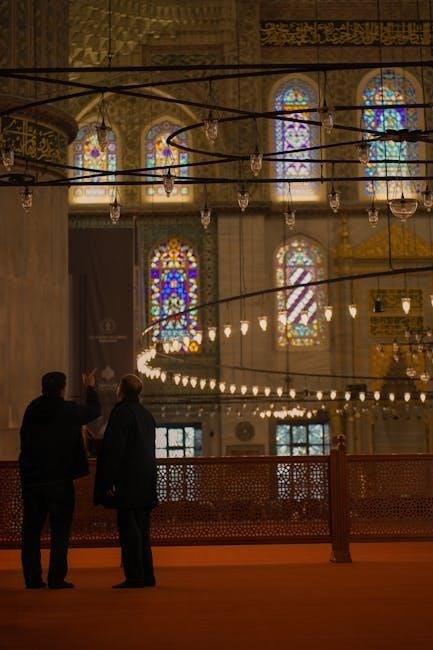
Most Common Dua After Namaz
The most common duas after Namaz include supplications for forgiveness, mercy, guidance, and health․ These prayers are rooted in Islamic teachings and are often detailed in Dua After Namaz PDF guides, ensuring believers can easily recite them with authenticity and sincerity․
Dua for Forgiveness and Mercy
Seeking forgiveness and mercy is a central aspect of Dua after Namaz․ Believers recite specific supplications to express remorse for sins and ask for Allah’s compassion․ One such Dua is: “O Allah, forgive me, have mercy upon me, and guide me․” This prayer, rooted in Islamic teachings, emphasizes humility and devotion․ Another widely recited Dua is: “Allahummaghfir li dhambi kulliha, wa akhzin min rahmatika wa hudaka” (O Allah, forgive all my sins, and envelop me in Your mercy and guidance)․ These supplications, often found in Dua After Namaz PDF guides, are supported by Hadith references, ensuring authenticity․ Regular recitation strengthens one’s connection with Allah and fosters spiritual purification; Such duas are particularly recommended after Fajr and Maghrib prayers, as these times are considered most favorable for acceptance․

Dua for Guidance and Protection
Dua for guidance and protection is a heartfelt supplication seeking Allah’s direction and safeguarding․ Believers often recite: “Allahumma inni as’aluka al-huda wat-tuqa wa khayra al-haal” (O Allah, I ask You for guidance, piety, and the best of conditions)․ This Dua, supported by Hadith references, emphasizes trust in Allah’s wisdom․ Another popular supplication is: “Rabbi ihdini as-sirata al-mustaqeem” (Lord, guide me to the straight path), reflecting a desire for righteousness․ These prayers, available in Dua After Namaz PDF guides, are recited to seek divine protection from evil and misguidance․ They foster a deep reliance on Allah, ensuring believers remain steadfast on the path of righteousness․ Regular recitation strengthens faith and provides spiritual reassurance, aligning one’s actions with Allah’s will․ Such duas are particularly recommended after Zuhr and Asr prayers, times of heightened spiritual focus․
Dua for Health and Well-being
Dua for health and well-being is a powerful supplication seeking Allah’s mercy and healing․ Believers often recite: “Allahumma ighfir lana, warhamna, wa aafeena, wa ahdi thaanoobina” (O Allah, forgive us, have mercy on us, grant us health, and guide us to repentance)․ This Dua emphasizes trust in Allah’s healing power․ Another recommended supplication is: “Ashhadu an la ilaha illallahu wahdahu la shareeka lah, wa anna Muhammadan abduhu wa rasooluh, Allahummaghfir lanaa dhunoobana, wa afhee lana min al-amaal as-siya’a” (I testify that there is no god but Allah alone, and Muhammad is His servant and messenger․ O Allah, forgive our sins and protect us from harmful actions)․ These prayers, found in Dua After Namaz PDF guides, are recited to seek divine healing and physical well-being; Regular recitation fosters gratitude and reliance on Allah’s grace, ensuring holistic health and spiritual balance․ Such duas are particularly recommended after Fajr and Maghrib prayers, times of heightened divine mercy․
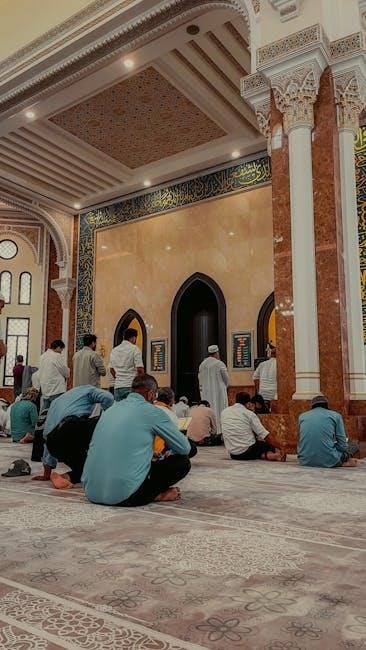
Dua After Each of the Five Daily Prayers
Dua After Each of the Five Daily Prayers provides specific supplications for Fajr, Zuhr, Asr, Maghrib, and Isha, with transliterations and translations from authentic Hadiths․
Dua After Fajr Prayer
The Fajr prayer, being the first of the day, holds significant importance․ After completing Fajr, Muslims are encouraged to recite specific supplications, such as seeking protection from Allah’s punishment on the Day of Resurrection․ The Prophet Muhammad (peace be upon him) would often recite, “O Allah, save me from Your punishment on the day You resurrect Your servants․” This dua, cited in Sahih Muslim (1334), is recommended to be recited three times after Fajr․ Such supplications not only strengthen one’s faith but also align with the Sunnah, emphasizing the value of starting the day with divine connection․ These duas are included in the Dua After Namaz PDF, providing transliterations, translations, and authentic references for easy practice․
Dua After Zuhr Prayer
Zuhr, the second obligatory prayer of the day, is followed by specific supplications recommended in the Sunnah․ After completing Zuhr, Muslims are encouraged to recite duas seeking forgiveness, protection, and divine mercy․ One such dua is the request for refuge from Allah’s punishment, as narrated in authentic hadiths․ The Fortress of the Muslim, a compilation by Darussalaam, includes these supplications, offering transliterations and translations for ease of understanding․ Reciting these duas after Zuhr helps believers maintain a spiritual connection and seek Allah’s blessings throughout the day․ The Dua After Namaz PDF provides these supplications in multiple languages, making them accessible for global Muslims to incorporate into their daily worship routines․ Regular practice of these duas aligns with Sunnah and fosters a deeper sense of humility and gratitude․
Dua After Asr Prayer
The Asr prayer, the third daily obligation, is followed by specific supplications that hold great significance․ After completing Asr, Muslims are advised to seek Allah’s protection and forgiveness through recommended duas․ One prominent dua is the request for safety from worldly trials and the Hereafter, as mentioned in Sahih Muslim․ The Dua After Namaz PDF includes these supplications, offering Arabic texts, transliterations, and English translations․ Such resources ensure that Muslims worldwide can recite these duas accurately, benefiting from their spiritual and emotional solace․ Regularly practicing these supplications after Asr strengthens one’s faith and invokes Allah’s mercy and guidance, aligning with the teachings of the Prophet Muhammad (peace be upon him) and the Sunnah․
Dua After Maghrib Prayer
Maghrib, the sunset prayer, marks the end of the day, making it a pivotal time for reflection and supplication․ After Maghrib, specific duas are recommended, many of which focus on seeking protection from worldly trials and the Hereafter․ The Prophet Muhammad (peace be upon him) emphasized the importance of these supplications, as recorded in Sahih Muslim․ The Dua After Namaz PDF compiles these prayers, offering detailed Arabic texts, transliterations, and English translations․ This resource is invaluable for those seeking to deepen their spiritual practice․ Regularly reciting these duas after Maghrib not only strengthens one’s connection with Allah but also invokes divine mercy and protection, aligning with the Sunnah and the teachings of the Prophet․
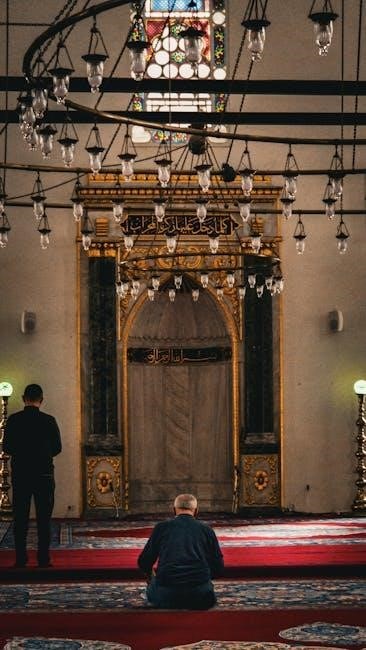
Dua After Isha Prayer
Isha, the night prayer, concludes the daily Salah cycle, making it a serene time for reflection and supplication․ After Isha, specific duas are recommended, focusing on seeking divine protection, forgiveness, and blessings․ The Prophet Muhammad (peace be upon him) often recited these supplications, as documented in Sahih Muslim․ The Dua After Namaz PDF includes these prayers, offering Arabic texts, transliterations, and English translations․ This guide helps believers connect deeply with Allah, invoking mercy and safeguarding against life’s challenges․ Regular recitation of these duas after Isha strengthens spiritual practice, aligns with Sunnah, and fosters a sense of peace and gratitude, essential for a believer’s spiritual growth and closeness to Allah․
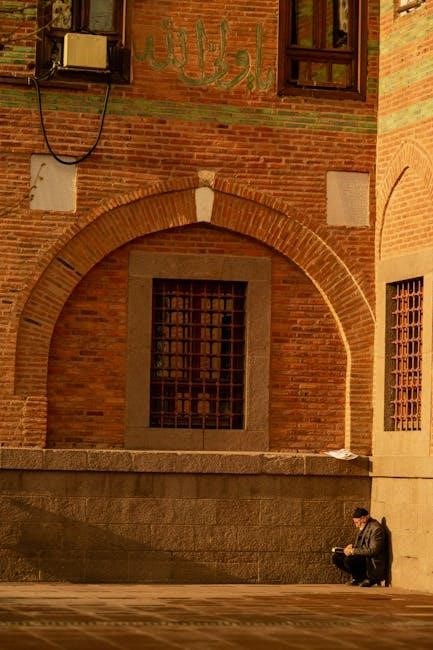
Authenticity and References
The Dua After Namaz PDF is authenticated through references from Sahih al-Bukhari and Sahih Muslim, ensuring its alignment with Islamic teachings․ Published by Darussalam, it guarantees reliability and accuracy․
Hadith References for Dua After Namaz
Hadith references play a vital role in authenticating the Dua After Namaz․ The Prophet Muhammad (peace be upon him) emphasized the importance of supplication post-prayer, as recorded in Sahih al-Bukhari and Sahih Muslim․ For instance, the Prophet would recite specific supplications after each prayer, such as seeking forgiveness and protection; One notable Hadith mentions that the Prophet would say, “O Allah, save me from Your punishment on the day You resurrect Your servants,” especially after Fajr and Maghrib prayers․ These references ensure the supplications are rooted in Sunnah, making them highly recommended and beneficial for believers seeking Allah’s mercy and guidance․ The Dua After Namaz PDF compiles these authentic Hadiths, providing clear and reliable guidance for Muslims worldwide․
Sunnah Practices for Dua After Salah
The Sunnah of the Prophet Muhammad (peace be upon him) provides a clear framework for Dua After Salah․ He would often remain seated after prayer, facing the Qiblah, and recite specific supplications․ Notably, he recommended reciting the Tasbeeh, Tahmeed, and Tashahhud after each prayer․ Additionally, certain supplications were emphasized after specific prayers, such as the Dua for Forgiveness after Fajr and Maghrib․ The Prophet also encouraged saying “Astaghfirullah” three times after each prayer to seek forgiveness․ These Sunnah practices are meticulously documented in the Dua After Namaz PDF, ensuring that Muslims can follow the Prophet’s guidance accurately․ By adhering to these practices, believers can strengthen their spiritual connection and draw closer to Allah’s mercy and blessings․
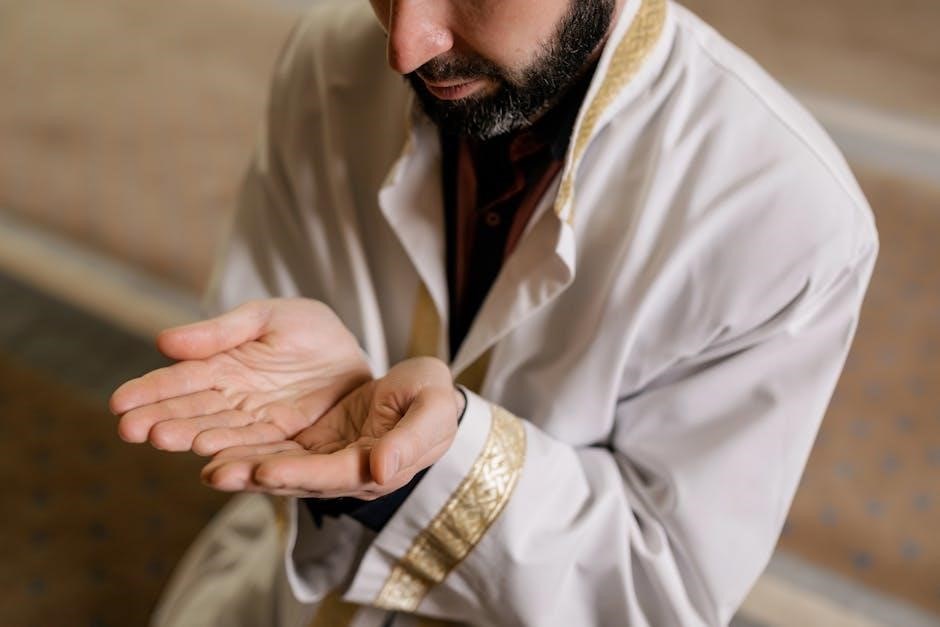
How to Download Dua After Namaz PDF
Downloading the Dua After Namaz PDF is a straightforward process․ Visit trusted Islamic websites like duaandazkar․com, where the PDF is available for free․ It is formatted for easy printing on A4, A5, or A3 paper sizes, ensuring accessibility for both home and commercial printing․ The PDF includes authentic duas in multiple languages, such as Arabic, English, Urdu, and others, along with transliterations and references from reliable Hadith sources like Sahih al-Bukhari and Sahih Muslim․ This guide is an invaluable resource for those seeking to enrich their spiritual practice with proper supplications after Salah․
Steps to Access the PDF File
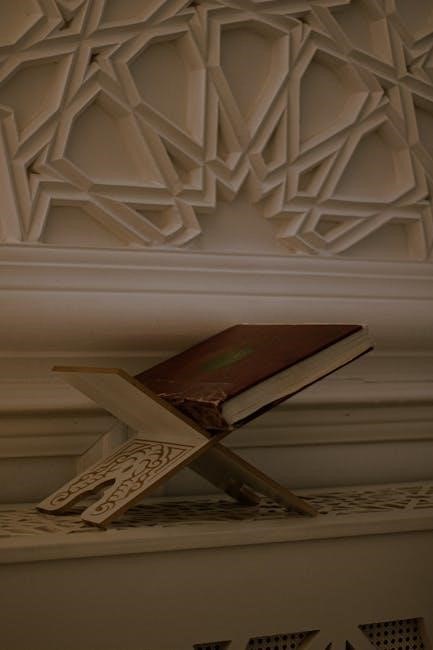
To access the Dua After Namaz PDF, visit trusted websites like duaandazkar․com or other reputable Islamic platforms․ Navigate to the section dedicated to duas and downloads․ Search for “Dua After Namaz” or similar terms to locate the file․ Click on the provided link to open the PDF in your browser․ From there, you can download it to your device or print it directly․ Ensure the website is reliable to guarantee authenticity and proper formatting․ The PDF is often available in multiple languages and paper sizes, making it convenient for personal or communal use․ Regularly check the website for updates to benefit from the latest versions of the guide․
Benefits of Using the PDF Guide
The Dua After Namaz PDF guide offers numerous benefits, including easy access to authentic supplications in multiple languages such as Arabic, English, and Urdu․ It provides transliterations and translations, making it accessible to all users․ The guide is formatted for various paper sizes, allowing users to print it conveniently at home or professionally․ Regular updates ensure that the content remains relevant and aligned with Sunnah practices․ Additionally, the PDF serves as a valuable resource for learning and memorizing duas, fostering a deeper connection with Allah․ Its portability and digital availability make it a practical tool for both personal and communal use, enhancing the spiritual experience of performing dua after each prayer․
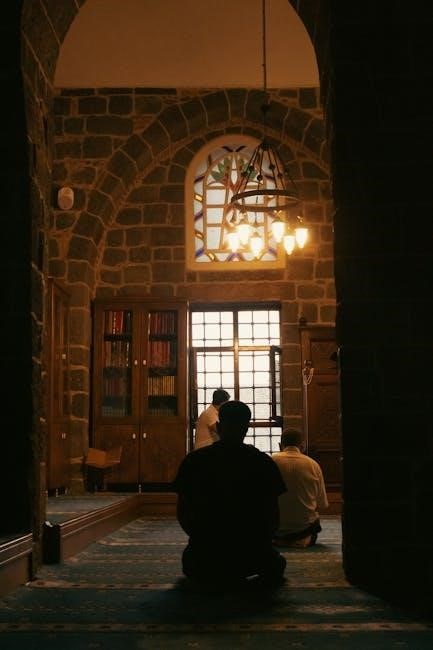
Virtues of Making Dua After Namaz
Making dua after namaz strengthens one’s connection with Allah, fostering humility and gratitude․ It is a means of seeking forgiveness and purifying the heart, enhancing spiritual growth․
Strengthening Faith and Connection with Allah
Making dua after namaz is a powerful means of deepening one’s faith and strengthening the bond with Allah․ By engaging in heartfelt supplications, believers express gratitude, seek guidance, and reflect on their spiritual journey․ This practice, rooted in Sunnah, encourages mindfulness and sincerity, fostering a closer relationship with the Divine․ Regularly reciting post-prayer duas helps cultivate humility, reliance on Allah, and a deeper understanding of His mercy and grace․ The act of supplication also serves as a reminder of Allah’s presence in daily life, reinforcing faith and trust in His wisdom․ Through consistent practice, individuals can experience spiritual growth and a heightened sense of connection to their Creator․
Seeking Forgiveness and Purification
Seeking forgiveness and purification through dua after namaz is a vital aspect of Islamic worship, emphasizing spiritual cleansing and moral renewal․ Believers are encouraged to recite specific supplications, such as the istighfar (seeking forgiveness), to acknowledge their shortcomings and seek Allah’s mercy․ These duas, often accompanied by dhikr and tasbeeh, help purify the heart and soul, fostering a sense of humility and repentance․ Regularly practicing these supplications, as guided by the Dua After Namaz PDF, strengthens one’s commitment to righteousness and serves as a means to attain divine forgiveness․ This practice, rooted in Hadith and Sunnah, highlights the importance of seeking Allah’s pardon and striving for spiritual purity in daily life․ Through these supplications, believers draw closer to Allah, seeking His mercy and guidance for a virtuous existence․
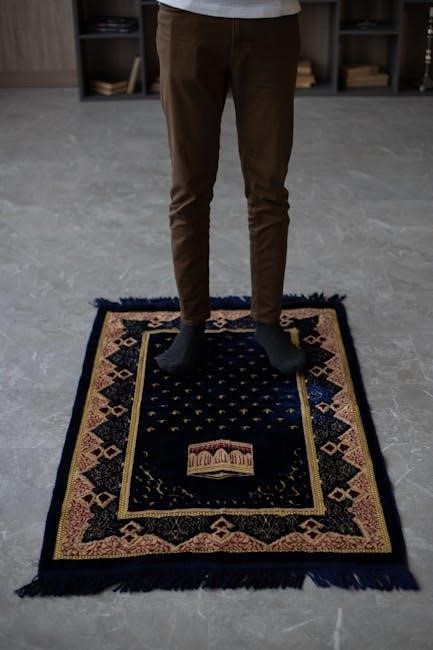
Dua After Namaz in Different Languages
Dua After Namaz is available in multiple languages, including Arabic, English, Urdu, Turkish, Spanish, German, and French․ The Dua After Namaz PDF provides translations, making it accessible for diverse learners to recite supplications accurately and meaningfully․
Arabic, English, Urdu, and Other Translations
The Dua After Namaz PDF offers translations in Arabic, English, Urdu, and other languages, ensuring accessibility for diverse learners․ Each supplication is provided with its Arabic text, transliteration, and English translation, facilitating understanding and correct recitation․ This comprehensive resource also includes references from authentic Hadith sources like Sahih al-Bukhari and Sahih Muslim, ensuring reliability․ Additionally, translations in Turkish, Spanish, German, and French cater to a global audience, making the practice of Dua After Namaz inclusive and universal․ The PDF guide is print-ready in various formats, allowing users to easily incorporate these supplications into their daily prayer routines for spiritual growth and connection with Allah․ This multilingual approach fosters unity and facilitates the practice of Dua After Namaz worldwide․
Recommended Dhikr After Salah
After Salah, recommended Dhikr includes Tasbeeh (Subhanallah), Tahmeed (Alhamdulillah), and Tashahhud․ Recite Tasbeeh 33 times, Tahmeed 33 times, and Tashahhud once, as taught by the Prophet (SAW)․ This practice, rooted in Sunnah, strengthens faith and seeks Allah’s forgiveness, as mentioned in Sahih Muslim․ The PDF guide provides these adhkar with translations and benefits, encouraging consistent practice after each prayer․
Tasbeeh, Tahmeed, and Tashahhud
Tasbeeh, Tahmeed, and Tashahhud are essential components of Dhikr after Salah․ Tasbeeh involves glorifying Allah with “Subhanallah” (33 times), Tahmeed is praising Him with “Alhamdulillah” (33 times), and Tashahhud is the seated glorification․ These practices, as taught by the Prophet (SAW), are highlighted in the Dua After Namaz PDF, providing translations and benefits․ Regular recitation strengthens faith and seeks forgiveness, aligning with authentic Sunnah․ The guide ensures ease of practice, making these adhkar accessible for all Muslims seeking spiritual enrichment and closeness to Allah․ Consistency in these acts is highly rewarded, as emphasized in Hadith references like Sahih Muslim․
Final Thoughts on the Importance of Dua After Namaz
Dua after Namaz holds profound significance in Islam, serving as a direct link to Allah․ It is a moment of sincere reflection, seeking forgiveness, and expressing gratitude․ The practice, rooted in Sunnah and Hadith, strengthens faith and fosters a deeper connection with the Divine․ By incorporating authentic supplications post-prayer, believers can gain spiritual growth and purification․ The availability of Dua After Namaz PDF guides in multiple languages ensures accessibility for all, providing structured and referenced supplications․ This practice not only enhances personal worship but also cultivates a sense of community among Muslims․ Embracing Dua after Namaz is a powerful way to seek Allah’s mercy and blessings, making it an indispensable part of daily Islamic devotion․
